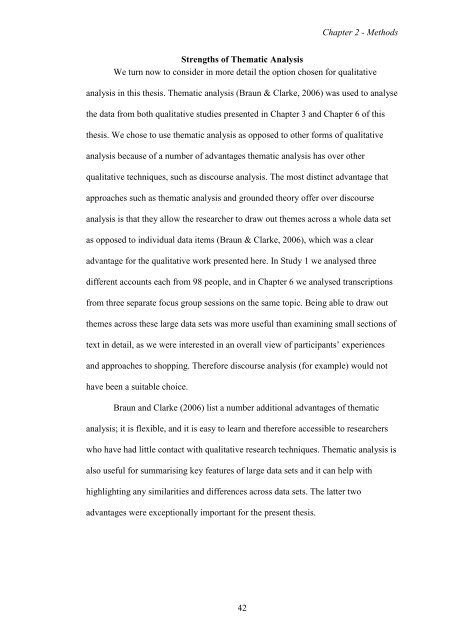CHAPTER 1 - University of Exeter
CHAPTER 1 - University of Exeter
CHAPTER 1 - University of Exeter
Create successful ePaper yourself
Turn your PDF publications into a flip-book with our unique Google optimized e-Paper software.
42<br />
Chapter 2 - Methods<br />
Strengths <strong>of</strong> Thematic Analysis<br />
We turn now to consider in more detail the option chosen for qualitative<br />
analysis in this thesis. Thematic analysis (Braun & Clarke, 2006) was used to analyse<br />
the data from both qualitative studies presented in Chapter 3 and Chapter 6 <strong>of</strong> this<br />
thesis. We chose to use thematic analysis as opposed to other forms <strong>of</strong> qualitative<br />
analysis because <strong>of</strong> a number <strong>of</strong> advantages thematic analysis has over other<br />
qualitative techniques, such as discourse analysis. The most distinct advantage that<br />
approaches such as thematic analysis and grounded theory <strong>of</strong>fer over discourse<br />
analysis is that they allow the researcher to draw out themes across a whole data set<br />
as opposed to individual data items (Braun & Clarke, 2006), which was a clear<br />
advantage for the qualitative work presented here. In Study 1 we analysed three<br />
different accounts each from 98 people, and in Chapter 6 we analysed transcriptions<br />
from three separate focus group sessions on the same topic. Being able to draw out<br />
themes across these large data sets was more useful than examining small sections <strong>of</strong><br />
text in detail, as we were interested in an overall view <strong>of</strong> participants’ experiences<br />
and approaches to shopping. Therefore discourse analysis (for example) would not<br />
have been a suitable choice.<br />
Braun and Clarke (2006) list a number additional advantages <strong>of</strong> thematic<br />
analysis; it is flexible, and it is easy to learn and therefore accessible to researchers<br />
who have had little contact with qualitative research techniques. Thematic analysis is<br />
also useful for summarising key features <strong>of</strong> large data sets and it can help with<br />
highlighting any similarities and differences across data sets. The latter two<br />
advantages were exceptionally important for the present thesis.
















